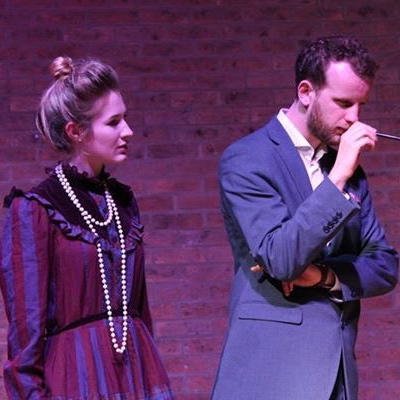 SPONSORED: Ensemble. A Great Start - Freddie Meyers' new opera A Sketch of Slow Time impresses Alice McVeigh.
SPONSORED: Ensemble. A Great Start - Freddie Meyers' new opera A Sketch of Slow Time impresses Alice McVeigh.
All sponsored features >>
- Lawrence Leonard
- Dido
- Sagra Musicale Umbra
- Reger
- opera
- Giacomo Puccini
- Ona Jarmalavičiūtė
- ECM New Series
 DISCUSSION: What is a work? John Dante Prevedini leads a discussion about The performing artist as co-creator, including contributions from Halida Dinova, Yekaterina Lebedeva, Béla Hartmann, David Arditti and Stephen Francis Vasta.
DISCUSSION: What is a work? John Dante Prevedini leads a discussion about The performing artist as co-creator, including contributions from Halida Dinova, Yekaterina Lebedeva, Béla Hartmann, David Arditti and Stephen Francis Vasta.
A Star is Born
GIUSEPPE PENNISI is impressed by
Enkeleda Kamani as Gilda in Verdi's 'Rigoletto'
at La Scala, Milan
2 September 2019 was a memorable evening at La Scala. I was very glad to be there for a 'sold out' performance. It was not memorable for the title Rigoletto, much loved by the audience and customarily presented every two to three years. Neither was it memorable for the staging - signed by Gilbert Deflo, director, Ezio Frigerio, sets, Franca Squarciapino, costumes and Marco Filibeck, lighting, dated 1994 - which was elegant and very traditional, already revived (with small adaptations) a dozen times. Nor for the conductor - a veteran of Verdi's repertoire like Daniel Oren. Nor for the protagonist, the almost eighty-year-old Leo Nucci, who has played the role more than 550 times: he now plays, more than the character, himself acting and singing Rigoletto.
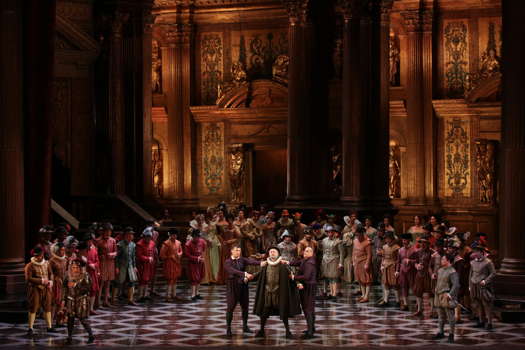
A scene from Verdi's 'Rigoletto' at Teatro alla Scala, Milan. Photo © 2019 Brescia/Amisano
It was memorable because in the sold-out theatre - an unusual event at La Scala especially at the beginning of September - a star was born: a very young Albanian soprano of La Scala's Academy, Enkeleda Kamani. She was applauded open stage after 'Caro Nome' in the first act, and received real ovations after 'Si Vendetta' at the end of the second. After ten minutes of ovations, she and Nucci were granted an encore - another unusual event at La Scala.
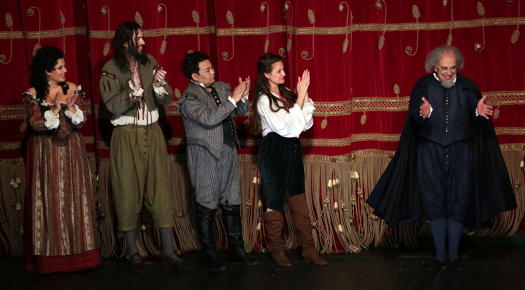
From left to right: Valeria Giradello as Giovanna, Toni Nezic as Sparafucile, Chuan Wang as the Duke, Enkeleda Kamani as Gilda and Leo Nucci in the title role at the end of Verdi's Rigoletto at Teatro alla Scala, Milan. Photo © 2019 Brescia/Amisano
Enkeleda Kamani was born in Fushe-Kruje, Albania. After studying singing in her hometown, she graduated from the University of the Arts in Tirana as the best student. She continued her studies with soprano Mariana Leka and completed a two-year masters degree with tenor Giuseppe Gipali. She also attended masterclasses with Ermonela Jaho and Elda Laro. In 2017 she won the AsLiCo competition for young opera singers for the role of Pamina in Mozart's Die Zauberflöte, and she performed in the theatres of the Lombardia Opera Circuit - Bergamo, Como, Brescia, Cremona and Pavia - under the direction of Federico Maria Sardelli. She was awarded at the prestigious Ottavio Ziino International Lyric Competition prize in Rome. At the same time, she was admitted to the Academy for Opera Singers of La Scala in Milan.
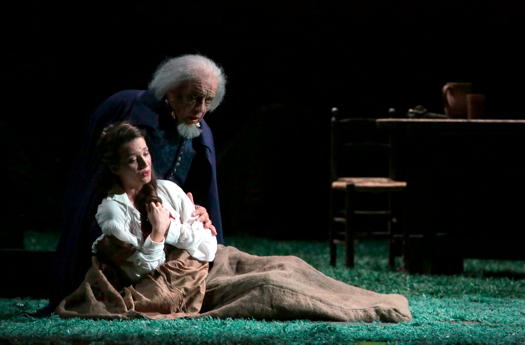
Enkeleda Kamani as Gilda and Leo Nucci in the title role of Verdi's Rigoletto at Teatro alla Scala, Milan. Photo © 2019 Brescia/Amisano
She has already taken part in several productions. In Rigoletto, she was simply perfect in the role of Gilda: young and virginal in a simple and elegant white robe (which stood out from the garish costumes of the others). She was so tender that Nucci held on to her heart with a paternal attitude when, as the curtain fell, there was a quarter of an hour of ovations. Vocally she dealt perfectly with the difficult role of Gilda who - like that of the protagonist of Verdi's La Traviata - would require two different sopranos: a lyric coloratura soprano in the first act, and from the middle of the second, a dramatic one.
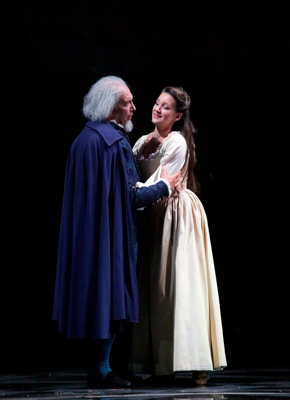
Leo Nucci in the title role of Verdi's Rigoletto with Enkeleda Kamani as Gilda. Photo © 2019 Brescia/Amisano
This is an indication not only of the quality of Enkeleda Kamani, whom we hope will choose her future roles well, in order to have a long and lasting success, but also of the La Scala Academy, from which, except for Nucci, all the evening's singers came. The Duke was Chuan Wang, a thirty-year-old Chinese tenor who in recent months sings, in addition to Milan, also in Geneva. He had a clear timbre, a seductive C, and was very good in the cabaletta, but he has to improve his legato and phrasing. Sparafucile was sung by Toni Nezic, an excellent Croatian bass, and Madeleine was Caterina Piva, an attractive Milanese mezzo, active on the Lombard Circuit and in Las Palmas. All the other young 'academicians' were good: Valeria Girardello as Giovanna, Giorgio Lomiselli as Monterone, Ramiro Maturana as Marullo, Kim Hum as Matthew Borsa, Lasha Sesitashvili as the Count of Ceprano, Marika Spadafino as the Countess of Ceprano, Hwan An as Usciere, and Francesca Pia Vitale as Paggio. Just scrolling through this list makes the international role of La Scala Academy apparent and vivid.
A success, thus, not only for the individual singers but for the institution.
Copyright © 7 September 2019
Giuseppe Pennisi,
Rome, Italy



